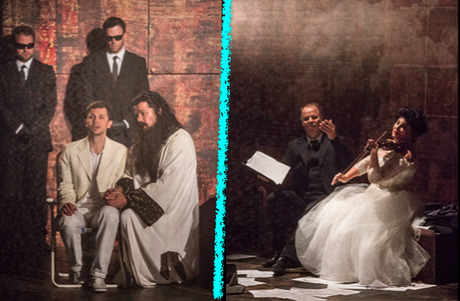by Paul J. Pelkonen

Bass András Paleerde (in robe, left, and in suit, right) does double duty in the Hungarian
National Opera's double bill of Mario and the Magician and Duke Bluebeard's Castle.
Photo by Zsofia Palyi © 2018 Hungarian National Opera.
On Thursday night, the Hungarian National Opera brought their eagerly awaited staging, by director of Péter Galambos, to its two-week festival program at Lincoln Center. Its counterbalance was the American premiere of Mario and the Magician, composer János Vajda's 1989 setting of a 1929 novella by Thomas Mann. On paper, it seemed like a good match. Both operas center around a star bass (András Palerdi) and each explore the problems of perception and truth from very different philosophical angles.
Thanks to the sloppy direction and set design, this twin bill was a mess. Mario placed the show of the magician Cippola in front of a Jerry Springer like audience, composed of various figures in violation of various copyrights. Marge Simpson, the (Heath Ledger) Joker, a wheelchair-bound Superman, Kenny from South Park, the Men in Black, Albert Einstein (also in a wheelchair) and unaccountably, Roger the Alien (from the Seth MacFarlane cartoon American Dad) were all present. Their job: reacting to the magic show in progress, an entertainment consisted of Cippola inducing a series of epileptic fits in various characters. For his troubles, the mage was finally being shot dead in a homophobic rage by the titular Mario. (Unfortunately, he was promptly resurrected.)
If all this pop culture goulash wasn't bad enough, the motley audience was filmed by close-circuit camera and front-projected on a scrim in front of the singers. This made the action hard to follow, and the series of zooms and talk-show closeups were repeatedly (and distractingly) interrupted by the failure of the computer circuits to connect, producing the kind of blue-screen tech failures that reminded one of the Robert Lepage Ring. All this did little to enhance this smug and slight opera, which seemed more clever than soulful despite the magisterial presence of Mr. Palerdi as the magician.
Happily, the performance of Duke Bluebeard's Castle that followed was better in (almost) every way. Mr. Palerdi and mezzo Ildikó Komlósi made an ideal power couple as the dysfunctional Duke and his doomed, curious, fourth wife. They were helped by a gripping and sensitive reading of the score by Balázs Kocsár. He achieved glowing crescendos, powerful silences and a genuine sense of tension and dread, milking this horror-movie music for every ounce of meaning. Particularly impressive: the slithering string-and-wind chords that accompanied the unveiling of the pool of tears and the work's midpoint climax with the opening of the fifth door.
However, Mr. and Mrs. Bluebeard were trapped in a malfunctioning, ugly production that largely consisted of a series of raised and lowered cycloramas meant to evoke the different aspects of Chez Barbe-bleu. The continued presence of the front scrim (a show curtain depicting the Tower of Babel drowning in a vast lake) helped to obscure the actors from view, and the constant raising and lowering backstage looked chaotic, as if the tech crew didn't know which rope to tie off.
This sense of obscurity extended to the work's chilling finale, in which Judith is permanently recruited into the ranks of Bluebeard's wives. Some appealing tension between the leads was resolved in a series of thunderous chords, but as Judith was meekly led off to stand in a corner one felt little but a sense of anticlimax. Then, Bluebeard went to sleep in an easy chair. A nurse (?!) came in, opened the windows, and tucked the homicidal hubby in, creating an ending that in effect destroyed the meaning of the entire drama that came before. This directorial decision did more damage than any computer glitch.

